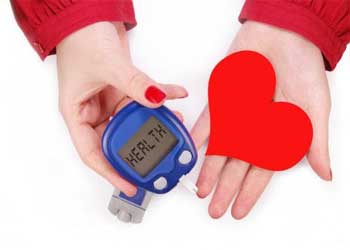- Home
- Editorial
- News
- Practice Guidelines
- Anesthesiology Guidelines
- Cancer Guidelines
- Cardiac Sciences Guidelines
- Critical Care Guidelines
- Dentistry Guidelines
- Dermatology Guidelines
- Diabetes and Endo Guidelines
- Diagnostics Guidelines
- ENT Guidelines
- Featured Practice Guidelines
- Gastroenterology Guidelines
- Geriatrics Guidelines
- Medicine Guidelines
- Nephrology Guidelines
- Neurosciences Guidelines
- Obs and Gynae Guidelines
- Ophthalmology Guidelines
- Orthopaedics Guidelines
- Paediatrics Guidelines
- Psychiatry Guidelines
- Pulmonology Guidelines
- Radiology Guidelines
- Surgery Guidelines
- Urology Guidelines
Detecting prediabetes early reduces risk of cardiovascular disease

WINSTON-SALEM, N.C.-According to scientists at Wake Forest School of Medicine, Detecting prediabetes early reduces the risk of cardiovascular disease. Therefore a diagnosis of prediabetes should be a warning for people to make lifestyle changes to prevent both full-blown diabetes and cardiovascular disease (CVD). The study is published in Diabetes Care.
Prediabetes is indicated by a fasting blood sugar level between 100 and 125 mg/dL (5.6 to 6.9 mmol/L), while a fasting blood sugar level of less than 100 mg/dL (5.6 mmol/L) is considered normal. A level of 126 mg/dL (7 mmol/L) and higher is the diagnostic threshold for diabetes.
"We know that having diabetes increases the risk of developing cardiovascular disease, so in our study we wanted to determine what the absolute risk or probability of developing heart disease was for people who were only at a pre-diabetic level of blood sugar," said the study's lead author Michael P. Bancks, Ph.D., assistant professor of epidemiology and prevention at Wake Forest's medical school, a part of Wake Forest Baptist Health.
In the study, the researchers used data from seven observational studies that included both white and black men and women who were followed from 1960 through 2015. Prior research focused on white Americans of European descent, whereas this study included African-Americans so the findings could be generalized to a broader population, Bancks said.
The sample included 19,630 individuals who had not had a prior CVD event, considered here as heart disease or stroke. Absolute risk of CVD was determined through analysis of participants' fasting glucose category beginning at age 55 through 85.
Bancks and colleagues found that the risk for CVD ranged from 15 percent (non-diabetic) to 38 percent (diabetic) among women and from 21 percent (non-diabetic) to 47 percent (diabetic) among men. Increases in glucose to the diabetic level during mid-life were associated with substantially higher cardiovascular risk than when glucose levels stayed below the diabetes threshold.
"Although we found that individuals who had pre-diabetic levels of blood glucose did not have a higher absolute risk for cardiovascular disease, we know that most people go on to develop diabetes unless they take measures to reduce their blood sugar levels," Bancks said.
"Our study provides further evidence that if you can avoid diabetes you may be able to stave off cardiovascular disease. Pre-diabetes should serve as a red flag to doctors to closely monitor their patient's blood sugar to try to prevent diabetes through lifestyle interventions like better diet and increased physical activity, and if necessary, with pharmacologic therapies."
For more details click on the link: https://doi.org/10.2337/dc18-1773

Disclaimer: This site is primarily intended for healthcare professionals. Any content/information on this website does not replace the advice of medical and/or health professionals and should not be construed as medical/diagnostic advice/endorsement or prescription. Use of this site is subject to our terms of use, privacy policy, advertisement policy. © 2020 Minerva Medical Treatment Pvt Ltd